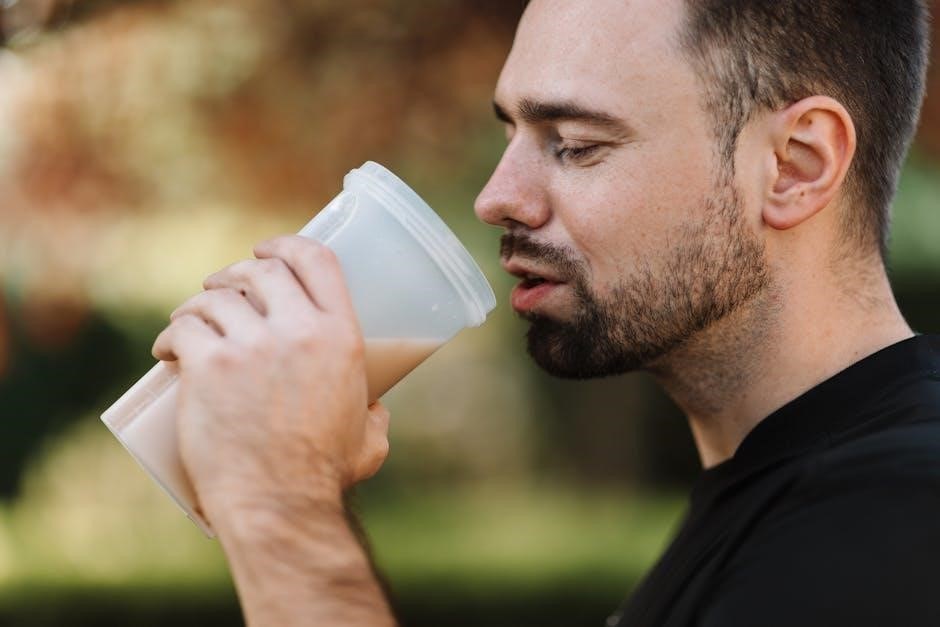A muscle gain diet plan is a structured guide to fuel your physique goals with proper nutrition․ It ensures a balance of proteins, carbs, and healthy fats to support muscle growth and recovery, helping you achieve your fitness objectives effectively․
Importance of Nutrition in Muscle Growth
Nutrition plays a pivotal role in muscle growth by providing essential nutrients for muscle repair and development․ A well-balanced diet ensures adequate protein, carbohydrates, and healthy fats, which fuel workouts and support muscle recovery․ Proper nutrition enhances muscle synthesis, prevents muscle breakdown, and maximizes the benefits of strength training․ Without adequate nutrition, even the most rigorous workout routines may fail to deliver desired results, making it a cornerstone of any successful muscle-building journey․
Overview of a 7-Day Muscle Gain Diet Plan
A 7-day muscle gain diet plan provides a structured approach to fuel your body for optimal muscle growth․ Designed to deliver 3000-3500 calories daily, it focuses on lean proteins, complex carbs, and healthy fats․ This plan supports resistance training and recovery, ensuring consistency in muscle-building efforts․ It offers meal prep ideas, balancing macronutrients to maximize muscle synthesis and energy levels, making it ideal for those aiming to gain lean muscle mass effectively․
Understanding Caloric and Protein Requirements
Caloric and protein intake are crucial for muscle growth, ensuring a calorie surplus and sufficient protein to support muscle repair and synthesis, tailored to individual needs․
Calculating Daily Caloric Intake for Muscle Gain
Calculating daily caloric intake for muscle gain involves creating a surplus of 250-500 calories above your maintenance level to support growth․ Use an online calculator to estimate your basal metabolic rate (BMR) and multiply by an activity factor․ Adjust based on age, weight, and activity level․ Monitor progress weekly and tweak intake to ensure steady muscle gain without excessive fat accumulation, balancing your diet for optimal results․
Role of Protein in Muscle Repair and Growth
Protein is essential for muscle repair and growth, providing the amino acids needed to rebuild and strengthen muscle fibers․ Aim to consume at least 1 gram of protein per pound of body weight daily, spread across multiple meals․ This supports muscle synthesis, prevents muscle breakdown, and aids in hormone production, ensuring optimal muscle recovery and growth after intense workouts․
Macronutrient Breakdown for Muscle Gain
A balanced intake of proteins, carbohydrates, and healthy fats is crucial for muscle gain․ These macronutrients provide energy, support muscle repair, and promote overall growth and recovery․
Carbohydrates: Energy Source for Workouts
Carbohydrates are the primary energy source for intense workouts, fueling muscle contractions and high-intensity activities․ Complex carbs like whole grains, fruits, and vegetables provide sustained energy, while simple carbs offer quick fuel․ Proper carb intake ensures optimal performance and prevents fatigue․ Timing carbs around workouts can enhance endurance and recovery, making them essential for a muscle gain diet plan․ Neglecting carbs may lead to low energy and hinder progress․
Healthy Fats: Essential for Hormone Production
Healthy fats are crucial for hormone production, including testosterone, which plays a key role in muscle growth․ Sources like avocados, nuts, and olive oil provide essential fatty acids that support overall health and recovery․ Including 20-30% of daily calories from healthy fats ensures proper bodily functions and optimizes muscle-building processes․ They also aid in the absorption of fat-soluble vitamins, making them a vital component of a muscle gain diet plan․

Meal Frequency and Timing
Meal frequency and timing optimize muscle growth by maintaining metabolism and energy levels․ Eating balanced meals throughout the day supports recovery and performance during workouts․
Benefits of Multiple Meals for Muscle Synthesis
Eating multiple meals throughout the day helps maintain a steady supply of nutrients for muscle repair and growth․ This approach supports protein synthesis by keeping amino acids available, preventing muscle breakdown․ It also stabilizes blood sugar levels, providing consistent energy for workouts․ Additionally, frequent meals boost metabolism, aiding in fat loss while preserving lean muscle mass․ This strategy ensures your body remains in an anabolic state, optimizing recovery and progress․
Pre- and Post-Workout Nutrition Strategies
Pre-workout meals should focus on carbs and protein to fuel performance and protect muscle․ Post-workout, prioritize protein and carbs within 30-60 minutes to aid recovery and muscle synthesis․ Proper hydration is also key for nutrient transport and muscle function, ensuring optimal recovery and growth․ This timed approach maximizes workout efficiency and supports muscle repair, helping you achieve your fitness goals effectively․

Sample 7-Day Meal Plan
A 7-day muscle gain meal plan provides a balanced intake of proteins, carbs, and fats, structured to support muscle growth and recovery throughout the week․
Breakfast Options for Muscle Growth
Breakfast is crucial for kickstarting muscle growth․ Opt for high-protein options like scrambled eggs, Greek yogurt, or oatmeal with nuts․ Include complex carbs such as whole-grain toast or avocado toast for sustained energy․ Smoothies with protein powder, spinach, and almond milk are also ideal․ Ensure each meal contains at least 30-40 grams of protein to support muscle repair and growth, helping you achieve your fitness goals effectively․
Lunch and Dinner Ideas to Maximize Protein Intake
Grilled chicken breast with quinoa and steamed vegetables is an excellent option for lunch, providing lean protein and complex carbs․ For dinner, salmon with brown rice and asparagus offers omega-3 fatty acids and fiber; Include lean beef or tofu stir-fries with mixed veggies for variety․ Pair these with avocado or olive oil for healthy fats․ Ensure each meal contains 40-50 grams of protein to optimize muscle synthesis and recovery․
Snacks and Supplements for Consistent Progress
Include protein shakes or mass gainers to meet daily protein goals․ Creatine and BCAAs support muscle strength and recovery․ Opt for snacks like nuts, dried fruits, or Greek yogurt for sustained energy․ Ensure supplements are balanced with whole foods to avoid nutrient deficiencies․ These additions help maintain consistency in muscle growth and recovery, especially when paired with a structured meal plan and regular training routine․

Hydration and Recovery
Staying hydrated is crucial for muscle function and recovery․ Aim for 1-1․5 gallons of water daily to support nutrient transport and waste removal․ Even mild dehydration can hinder performance and recovery, making it essential to prioritize water intake alongside a balanced diet and adequate sleep for optimal muscle growth and overall progress․
Importance of Water Intake for Muscle Function
- Water is essential for muscle function, comprising 75-80% of muscle tissue․
- It facilitates nutrient delivery, waste removal, and maintains cellular hydration for optimal performance․
- Even mild dehydration can reduce strength, endurance, and recovery efficiency․
- Adequate hydration supports digestion and absorption of nutrients critical for muscle growth․
- Aim for 1-1․5 gallons daily to ensure proper muscle function and recovery․
Role of Sleep in Muscle Recovery
Sleep plays a crucial role in muscle recovery by regulating hormones that repair and grow muscle tissue․ During deep sleep, testosterone and growth hormone levels peak, promoting muscle repair․ Poor sleep quality can disrupt this process, leading to slower recovery and reduced muscle growth․ Aim for 7-9 hours of quality sleep nightly to support muscle function and overall physical restoration․ Proper rest enhances workout consistency and long-term muscle development․

Maintaining and Adjusting the Diet Plan
Regularly track your progress and adjust caloric intake to ensure consistent muscle growth․ Incorporate variety in meals to avoid plateaus and maintain motivation over time․
Tracking Progress and Adjusting Caloric Intake
Regularly monitor your weight, body fat percentage, and muscle mass to assess progress․ Adjust your caloric intake based on gains or stalls, ensuring a slight surplus for growth․ Use a food diary to track meals and stay accountable․ Weekly weigh-ins and progress photos can help identify trends․ Fine-tune your diet plan to maintain momentum, avoiding excessive calorie consumption that may hinder results․ Consistent adjustments ensure optimal muscle growth and prevent plateaus․
Incorporating Variety to Avoid Plateaus
Incorporating variety into your diet prevents plateaus by keeping your metabolism active and ensuring a broad intake of nutrients․ Rotate protein sources like chicken, fish, and beef, and include diverse carbs such as rice, oats, and sweet potatoes․ Healthy fats from avocados, nuts, and seeds add variety․ Periodically adjust portion sizes or calorie intake to stimulate growth․ A varied diet also keeps meals enjoyable, making it easier to stick to your plan long-term․
Common Mistakes to Avoid
Common mistakes include overtraining, undereating, and neglecting balanced nutrition, which can hinder muscle growth and overall progress․ Avoiding these errors ensures sustainable muscle gain and better results․
Overtraining and Undereating
Overtraining and undereating are common mistakes that hinder muscle growth․ Overtraining leads to muscle fatigue and prevents recovery, while undereating deprives your body of necessary calories and nutrients for muscle repair and growth․ Both can result in plateaus, decreased performance, and potential health issues․ Balancing workout intensity with adequate rest and nutrition is crucial for sustainable muscle gain and overall well-being․ Avoid these pitfalls to ensure steady progress toward your fitness goals․
Neglecting Balanced Nutrition
Neglecting balanced nutrition can severely hinder muscle growth and overall health․ A diet lacking essential nutrients like protein, carbohydrates, and healthy fats disrupts muscle repair and energy levels․ Over-reliance on a single food group can lead to deficiencies, slowing progress and causing fatigue․ A well-rounded diet ensures all nutritional needs are met, supporting muscle growth and maintaining optimal bodily functions for sustainable gains and long-term health․
A well-structured muscle gain diet plan, combined with consistency and patience, is key to achieving sustainable results․ Stay committed to your goals and celebrate progress․
Final Tips for Successful Muscle Gain
Stick to your diet plan consistently, ensuring a balance of proteins, carbs, and fats․ Track your progress and adjust caloric intake as needed․ Prioritize whole, nutrient-dense foods and stay hydrated․ Aim for 7-9 hours of quality sleep nightly to support recovery․ Avoid overtraining and undereating, as these can hinder progress․ Incorporate variety in meals to prevent plateaus and maintain motivation․ For optimal results, consider consulting a nutritionist to tailor your plan to your specific needs and goals․
Long-Term Sustainability of the Diet Plan
A sustainable muscle gain diet plan focuses on consistency and adaptability․ Incorporate balanced nutrition, hydration, and adequate sleep for long-term success․ Avoid extreme restrictions and gradually adjust calorie intake as goals evolve․ Regularly monitor progress and consult a nutritionist for personalized adjustments․ Maintain variety in meals to prevent plateaus and ensure enjoyment․ By prioritizing health and consistency, you can achieve and maintain a strong, lean physique over time․

